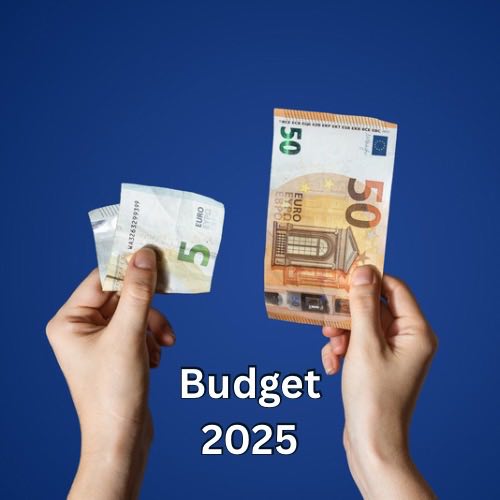As Budget 2025 is set to be revealed tomorrow, coalition leaders have spent their evening ironing out the details. With the country facing severe housing, health, and education crises—and a government sitting on a surplus of €25 billion—many will be questioning where the real priorities lie. Here’s what we know about the budget so far. Budget 2025: What We Know So Far
Taxation Changes: A Small Relief for Some, But What About the Rest?
The point at which people begin paying the higher 40% rate of tax is expected to increase from €42,000 to €44,000, largely to reflect rising wages. With wages rising by 5% annually, this modest adjustment will barely keep up with inflation. Meanwhile, the Universal Social Charge (USC) on incomes between €25,000 and €70,000 is expected to drop from 4% to 3%. While this is a Fianna Fáil priority, it’s a small consolation when core issues like housing remain unresolved.
Every Household Gets Energy Credits—But Will It Be Enough?
Every Irish household will receive two €125 energy credits before Christmas as part of a €2 billion cost-of-living package. These credits, set to be paid out in November and December, aim to ease the pressure on households facing rising energy bills. However, while this is welcome news, it’s worth questioning whether these one-off payments address the deeper issues of Ireland’s energy market or are merely short-term relief.
A Minimum Wage Bump—But Not Enough
The minimum wage is set to rise by just 80 cents, bringing it to €13.50 per hour—less than the €1 increase recommended by the Low Pay Commission. As the cost of living continues to skyrocket, this minimal increase does little to help those struggling to get by, especially in a country where rents are at record highs and public services are crumbling.
Inheritance Tax: A Token Gesture in the Face of a Housing Crisis
The inheritance tax threshold is set to rise by €65,000, increasing the limit to €400,000 for children who inherit property. With house prices now higher than they were during the 2007 boom, this move will likely benefit a small fraction of the population while doing little to address the systemic issues in housing affordability and availability.
Renters Tax Credit: A Band-Aid on a Broken System
Renters can expect their tax credit to rise from €750 to €1,000, but in a market where rents are soaring, this is hardly enough. Even with the credit, many tenants are still forced into overcrowded, substandard housing due to the government’s failure to properly tackle the housing crisis.
Extending the Help to Buy Scheme: Good News for Developers?
The Help to Buy scheme, which allows first-time buyers to claim up to €30,000 back in income tax, is expected to be extended until 2029. Critics rightly argue that this policy inflates house prices and benefits developers more than buyers. With the housing crisis deepening, this extension seems more like a handout to developers than a solution for those trying to enter the housing market.
A Record-Breaking Social Protection Package—But at What Cost?
The government will likely tout their €2.7 billion social protection package as the largest in the state’s history. Yet, a €12 weekly increase in social welfare does little for families who face the harsh realities of a broken healthcare system, skyrocketing rents, and expensive childcare. Double child benefit payments before Christmas sound nice on paper, but they won’t fix the systemic issues at play. Meanwhile, the much-publicised ‘baby boost’ payment is a distraction from the fact that government childcare reforms still fall short.
Outrageous Spending on Modular Homes
In the midst of these crises, news has emerged that the government is paying over €440,000 for tiny two-bedroom modular homes being made available for those seeking refuge from Ukraine. At a time when Irish citizens are struggling to secure affordable housing, this is an astonishing misallocation of funds.
The World’s Most Expensive Hospital—and We’re Still Waiting
Let’s not forget the ongoing saga of the National Children’s Hospital, now set to be the most expensive hospital in the world. While healthcare waiting lists grow and patients suffer, the government continues to pour billions into a project plagued by delays and cost overruns.
Public Transport Expansion: A Step Too Late?
The Green Party has pushed for free public transport for children under nine, an expansion from the current cut-off of five years old. It’s a positive move, but at this stage, it feels like too little, too late. With families struggling to access reliable healthcare, education, and housing, is free transport enough to offset the wider failures of government policy?
As the final budget is announced tomorrow, it’s clear that these measures, while offering some relief, are far from the transformational changes needed. With €25 billion in surplus, the government could do so much more to tackle Ireland’s deepest crises, but instead, we get incremental measures that fail to address the root causes of our housing, healthcare, and education woes.
Budget 2025: What We Know So Far
I’ll be covering all the news about Budget 2025 as it happens tomorrow on TikTok, so stay tuned!

